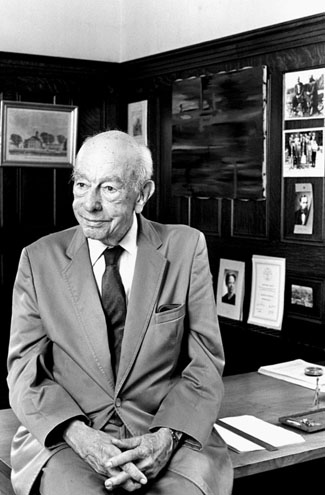Quine, 92, was major philosopher of 20th century

Willard Van Orman Quine, one of the most important philosophers of the 20th century, died on Christmas Day at the age of 92.
In more than 20 books that have been translated into some 50 languages, Quine has addressed topics both weighty and whimsical. Noted for his wit, compendious scholarship, and generosity, he is best known for his contributions to the theory of knowledge and logic. He has guest-lectured on five continents.
According to Charles Parsons, the current Edgar Pierce Professor of Philosophy, Quine’s best-known contributions to logic are the New Foundations system of set theory (1937) and his writings on basic logic and its philosophy.
Parsons said that Quine was also a major general philosopher, “developing a naturalistic position with many ramifications – in particular his much-discussed criticisms of the notion of analyticity and of other received notions concerning language and meaning.”
Parsons, who studied with Quine as both an undergraduate and a graduate student, said that he was always impressed by Quine’s high intellectual standards and his habit of reading student papers with extreme thoroughness.
“His writing was very eloquent and economical, and there was a similar economy in his conversations, his teaching, and his relations with people. He was very sociable, but he wasn’t given to talking when he didn’t have something to say,” Parsons said.
Parson described Quine’s lectures as “very well organized” with a tendency toward compression. “His speaking style was somewhat deadpan; he didn’t have the vivid lecturing style that many of the best teachers have. He showed a sense of humor, but it was understated.”
Reviewing Quine’s “Quiddities: An Intermittently Philosophical Dictionary” (1987), a collection of sometimes whimsical short essays, Hilary Putnam, the Cogan University Research Professor, praised Quine as “not only a great philosopher, but also a master of the English language and a genuine polymath.”
Putnam wrote that “Anyone who wants to encounter a great philosophical mind in a less technical mood, and to get some feeling for Quine as a peerless companion, raconteur, and amused commentator on the passing show . . . cannot do better than to read this book.”
Ihor Sevcenko, the Dumbarton Oaks Professor of Byzantine History and Literature Emeritus, met Quine in 1974 when Sevcenko became a member of the American Academy of Arts and Sciences. Quine, who lectured in six languages and wrote one of his books in Portuguese, walked up to Sevcenko after the meeting and addressed him in Polish. Sevcenko, who is also multilingual, had studied in Warsaw before going on to earn advanced degrees in Prague and Louvain.
“He took to me because I knew the names of logicians in Warsaw and because I was able to answer his questions about Greek and Slavic etymologies,” Sevcenko said.
Sevcenko knew Quine principally as a fellow member of the Faculty Club’s “Wolfson Table,” a lunchtime discussion group initiated by the legendary Harvard scholar Harry Wolfson. Among this group, the quality of Quine’s intellect always shone brightly.
“He spoke about the great philosophers as his equals whose views he either accepted or not. He was very fond of Hume, not so fond of Plato.”
According to Sevcenko, the qualities that characterized Quine were unpretentiousness, unfailing curiosity, an unwillingness to talk about himself, and an avoidance of confrontation and intellectual skirmishing.
“He was the epitome of greatness and the absolute opposite of pomposity,” Sevcenko said.
Prudence Steiner, former director of the writing program at the Extension School and wife of former Harvard General Counsel Daniel Steiner, knew Quine as a fellow member of the Eliot House senior common room. She remembers talking to him about a wide variety of subjects, including etymology, geography, Gilbert and Sullivan, and politics.
“In all these conversations he was good-humored, open, laconically funny, and very warm. I found it amazing that someone with so rigorous a mind could be so welcoming and open to all sorts of topics,” she said.
Steiner remembered one particular aspect of Quine as a conversationalist:
“When he heard something that pleased or surprised him, his face would light up and he’d say ‘Oh, good!’ as though he’d just been given a gift.”
Born in Akron, Ohio, Quine earned his A.B. at Oberlin (1930) and his Ph.D., under Alfred North Whitehead, at Harvard (1932).
After joining the Harvard faculty in 1936, he rose to full professor in 1948, and became the Edgar Pierce Professor of Philosophy in 1955. He retired in 1978.
Quine’s many books include: “Mathematical Logic” (1940), “Methods of Logic” (1950), “From a Logical Point of View” (1953), “Word and Object” (1960), “Set Theory and its Logic” (1963), “Ontological Relativity and other Essays” (1969), and “Philosophy of Logic” (1970). In 1985, he published his autobiography, “The Time of My Life.”
Quine received many honors, in particular the first Rolf Schock Prize (Stockholm, 1993) and the Kyoto Prize (Tokyo, 1996). He was a senior fellow of the Harvard Society of Fellows, a member of the National Academy of Sciences, the American Academy of Arts and Sciences, and has served as president of the eastern division of the American Philosophical Association.




